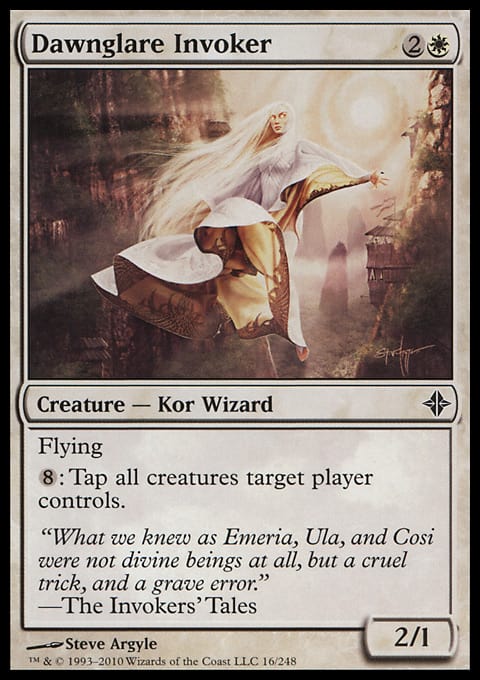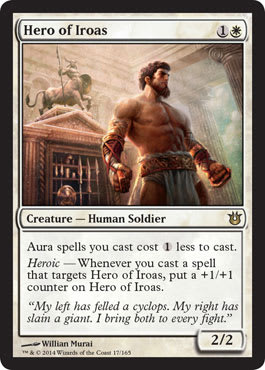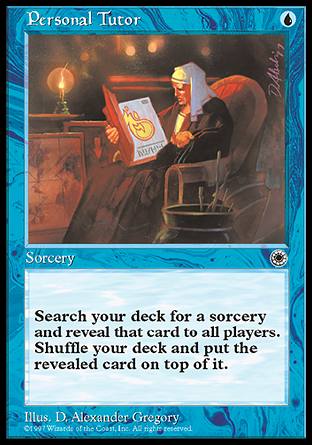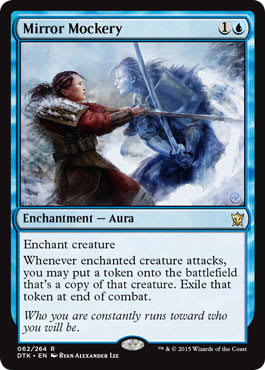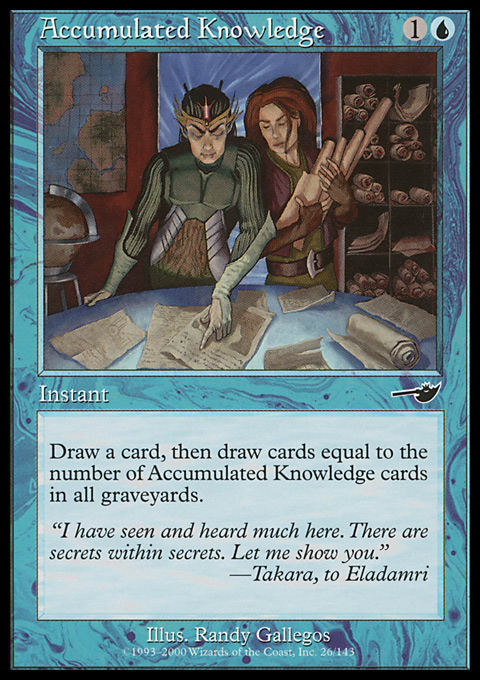A few months back, my dad asked about my writing endeavors. He’s the kind of guy who reads everything I pen even—though he hasn’t touched a Magic card since I tried to teach him the game back in the late nineties—simply because his son was the author. He knew I had started a series on the process of writing about Magic and was interested to see how I was finding the process.
Dad: No [expletive deleted]!
He was right in the familiar way of fathers everywhere: the way that speaks to the surface level of the issue and its deepest core while also challenging their progeny to meet the obstacle head on.
Not heeding the paternal callout, I let this notion simmer and fester in the back of my skull. I wanted to write on this subject again, but I didn’t feel that I had anything to say. This, of course, violates the Prime Directive of writing. I was facing a serious bout of writer’s block, a topic worth its own piece, and I was having problems getting past the first words. I retreated to a comfort zone: message boards.
Before I began my journey with published words, I frequented Pauper Magic (commons only) forums to espouse theories and decks. I became a known quantity in the player-run event community of the mid-aughts Magic Online. While those digital spaces are largely abandoned, a new remains: the Pauper subreddit. I retreated to a previous incarnation and focused on these comments, specifically those about growing the Pauper community through content.
The lightbulb went bright.
I have gone into detail about the process of the act of writing, but far less into what it takes to become published. The Internet is a great democratizer, where anyone with a valid point and a good network can be heard, but to make it to the front page of a website specifically designed around Magic content, well, for a long time, it was a dream. I can only imagine that for some other aspiring writers, the goal is similar if not the same. So with that said, let us begin discussing the ways to bring your words out into the world.
Win a Tournament
While this could also be titled “Doing Well at a Series of Events,” the conceit is the same. Despite the fact that many of Magic’s very best decry results-oriented thinking, there is truth to the mantra of “Scoreboard!” Winning sells, and it is an easy way to start building a name for yourself and your writing.
If you are already doing well at high-level events, there is a better-than-zero chance that you are already creating content in one way or another. Spike a tournament from nowhere, and now you have a story to tell. This was the case with Justin Cohen and his second-place finish at Pro Tour Fate Reforged. By his own admission, Cohen was a Limited junkie and occasional Pro Tour Qualifier player who was urged by his friend Sam Black to treat Magic as a serious endeavor. These tales are attractive because they act as pastiche of the Heroic Archetype. A player has untapped potential, and it is only after taking a step to the next stage that someone’s prowess can be on display. The tournament report is the completion of the journey, acting as the return.
The arc provides comfort in the familiar while also acting as inspiration: “The author can do it, so I can as well.” These articles are popular because they have a broad appeal to the aspiring greats of the world. One only needs to look to one of the greatest tournament reports of all time in Hall of Famer Paul Rietzl’s “A Champion Returns” to see another version of this arc unfold.
In a similar vein, we have Hall of Famer Gary Wise’s retrospective for StarCityGames. Gary was able to write this piece for many reasons, not the least of which center around his ring. The man is a legend and has a body of work that has influenced a successive generation of writers. While he may not have performed well at the recent Pro Tour, it were his past victories and his volume of words that granted him passage to the space above the fold.
The Writer’s Way
Winning a major event or doing something of note is one way to earn a spot on the marque. And yet, not everyone wants to write about the tournament scene or is qualified for major events. It seems backward that if one wants to write about Commander, the best way is to win the Pro Tour. The more common way to make your own headline is to become noticed by an editor and parlay that into a slot on the roster. What does that look like?
Writers Write
Start creating content. The location does not matter, but what does is that your writing makes it to a place where people can consume your words. The Internet is important here in that anyone can start a blog for minimal cost. Start collecting your thoughts and modeling them after articles you want to emulate, and turn them into articles on your very own site. This is the first step.
The second is to do it again—and again. You guessed it—and again.
Writing one standout piece is wonderful, but if the goal is to find a roster spot somewhere else, best to keep to a regular schedule. Whether that means once a day or twice a month, the target should be to create consistently at a quality level. Now, obviously, some posts are going to be better than others, and that’s okay. Not everything can be “Who’s the Beatdown?” and once a writer starts creating content periodically, that becomes readily apparent. By no means does this mean that one should not give every piece everything one feels the words deserve, but sometimes, life happens.
Generating content on a schedule can be a challenge at the start. Moving from a model where you write when you want to one where you write because you have a deadline is a seismic shift. The goal is to have sources of inspiration. Paulo Vitor Damo da Rosa is well known for taking to Twitter in the search for topics. Many writers routinely do mailbag columns, asking their fans for topics for discussion. When setting up your first schedule, think about topics you may be interested in, and then build out from this starting point. Each branch of this tree can become an article.
Let’s use Cube as an example. Deeper discussions regarding Cube can deal with the volume of certain styles of cards, archetypes, and issues with color strength. Topics to be revisited in times when the words don’t flow could include Crack-a-Packs, draft-deck discussion, debating the merits of different cards for a particular slot, and new card reviews. Moving further away from the center, one could chronicle a Draft or talk about how a Cube is a reflection of its curator. The idea is to find a focal point (or many) and think about everything that can stem from that subject. These are articles in your back pocket for when you can’t generate an idea before the deadline approaches.
Another option is to find a site that is willing to take open submissions. Some sites let new writers contribute work. These submissions may be more heavily scrutinized than work submitted by those on a schedule. There is a chance that the work may be sent back for editing and polish, but succeeding in this avenue could create opportunities.
Networking
Once you’ve started creating content, the next step should be to send it out into the world. Social media is fantastic for this task. The current day’s “word of mouth” is having an account that can share your links. Here is where a personal network can come in handy: Asking friends to review your work and share it themselves can only expand your reach and influence. The name of the game is getting more eyes on your writing, so any and all connections are valuable.
This act is intentional and is the crafting of a personal brand. While this may be uncomfortable for some individuals, it is part of being a public-facing figure. If the first goal is to be hosted on a major website, one must be comfortable with a persona that exists adjacent to the actual self. Moving forward, I am going to assume that this is in line with the writer’s wants and desires.
Branding is an odd act. Speaking from my own experience, it is similar to casting Mirror Mockery targeting me. It is putting forth an image into the world that is parallel to who I actually am, but focused as a specific group. Branding can work wonders for identifying a signal in noise. Brian Kibler and Patrick Chapin are both incredibly successful at managing their personas (the Dragonmaster and the Innovator), and in the age of streaming, Kenji “Numot the Nummy” Egashira and Paul “Paul” Cheon have been able to do the same. Erin Campbell has built herself up to be one of the community’s premier podcasters and has a clear identity and voice as a B/G midrange mage. These are all real people, but the person any one of them is at a tournament or during a broadcast is only one facet of who that person actually is. This is the person’s brand, and they all use these brands to promote themselves and their content.
Doing this, in turn, allows a writer to carve a niche. Much like crafting regular content will help to attract viewers, having a particular voice or common themes does something similar. There is a reason that Adam Styborski pens Command Tower and Marshall Sutcliffe is the current steward of Limited Information: They are publicly tied to those formats from previous endeavors.
One Path
To illustrate this point, I am going to use myself as a case study. I started writing about Magic in early 2005. I had become involved in the online Pauper community and started writing rather long forum posts. When a fan site was started, I contributed infrequently to its content. Eventually, I submitted an article to StarCityGames.com and it had posted to the front page (back when they took open submissions). I then went back to writing long forum entries.
Eventually, I drifted back to writing, this time at PureMTGO.com, another site that took submissions, and I wrote there semi-regularly for a number of years. I remained laser-focused on Pauper, and in 2009, I was invited to the first Community Challenge Cup due to my work with Pauper. I had started to build a reputation as the Pauper guy.
I started going to stores where people didn’t recognize me but recognized my work. I stopped writing as regularly until I was contacted by StarCityGames to provide articles on, you guessed it, Pauper.
I parlayed this into a gig at this very site discussing my other passions: Cube, Commander, and writing about Magic (so meta). When my gig ended at StarCityGames, I returned to PureMTGO, where I continue to provide Pauper content.
Winning, as I said, is sexy. But winning is not the only prerequisite to becoming noticed. Write often, write well, and as always, have something to say. Most of all, don’t be afraid to write and share your work. Be ready to learn from your critics, and do not become discouraged if you are not asked back. Have a home base where you can continue to push your thoughts to the world and the signal can’t die out. Never stop writing, and you’ll never stop having readers—whether you headline or are at the bottom of the page, eyes will be on your words.
That feeling is indescribable.
Go write, and experience it for yourself.
References
- Justin Cohen, “Pro Tour Fate Reforged *2nd*”, StarCityGames.com
- “Hero”, Wikipedia.org
- Paul Rietzl, “A Champion Returns”, magic.TCGplayer.com
- Gary Wise, “Of Pro Tours and Time Warps”, StarCityGames.com
















